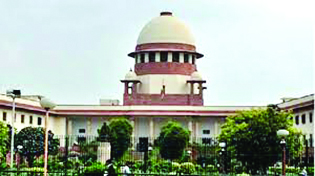SC urges DDA to consider plea of Sarojini Nagar jhuggi dwellers

New Delhi: Terming it as a “humane problem”, the Supreme Court of India on Tuesday(April 11) urged the Delhi Development Authority to take steps to consider the plight of jhuggi dwellers from Delhi’s Sarojini Nagar, according to legal news website Live Law.
A Bench of Justices KM Joseph and BV Nagarathna orally requested the Additional Solicitor General to “make use of his good offices” to solve the issue. “It’s a humane problem. We have to see it in that way”, the bench
commented.
The bench was considering a petition filed by jhuggi dwellers from Sarojini Nagar against the demolition/ eviction orders without rehabilitation or relocation of the Slum Dwellers. The SLP was filed challenging the order passed by the Division Bench of Delhi High Court refusing to interfere with Single Judge’s order declining to provide Rehabilitation/ Relocation of the Slum Dwellers residing in Jhuggis of Sarojini Nagar,
New Delhi.
As per the High Court’s order, in order to avail the Rehabilitation under the Delhi Slum and JJ Rehabilitation and Relocation Policy, 2015, the respective Jhuggi Jhopri Basti would have to be notified by the nodal agency Delhi Urban Shelter Improvement Board.
About a year ago, the Top Court had asked the Central Government to desist from taking coercive steps to evict the jhuggi dwellers in question.
During the hearing, the Bench heard Senior Advocate Vikas Singh and ASG KM Natraj.
Singh argued that even if the Jhuggi dwellers haven’t been notified, they have been occupying the land for long. Going through the relevant paragraphs in the Delhi High High Court order in the Ajay Maken case which discussed the right of rehabilitation, Singh pointed to the Court’s observation that Jhuggi dwellers shouldn’t be treated as secondary citizens.
Relying on another Gujarat High Court order, Singh further stated that the right to shelter extends to pavement dwellers also. “The High Court said that you can’t just ask them to leave one day”
“It’s a very noble idea”, remarked Justice Joseph.
“That’s why urban planning is important”, said Singh.
“As against the overriding public interest to take that land….you have to locate them somewhere else.
Again, it has to be on public land. There will be a constant shifting. Will that be an absolute fundamental right?”, Justice Joseph queried. Singh’s answer was yes.
“Unfortunately, in big cities, there is no slum development with proper transportation and hygienic facilities”, he said while adding that this is a problem in the urban areas.



